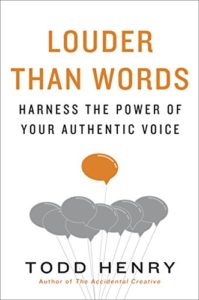by Todd Henry
To develop your authentic voice, you must cultivate three things: a strong sense of identity, which means doing work that is rooted in something substantive and personally meaningful; a consonant vision for your work, meaning a sense of the ultimate impact you want to have; and mastery of your skills and platform.
A strong, authentic, compelling voice is the expression of identity, guided by vision, and achieved through mastery. These three work together as a part of the lifelong process of growth and discovery. Developing your authentic voice is the result of lifelong layers of learning, experimentation, and failure.
While it’s possible to piece it all together over time through trial and error, I want to help you accelerate the process by building practices around each of these three core drivers.
1. Identity
 Identity is primarily defined by the question “Who are you?” If I informally ask you that question, there are a number of ways you could respond. You could tell me about your childhood experiences, your job, your hobbies, your political views, or any number of other defining characteristics.
Identity is primarily defined by the question “Who are you?” If I informally ask you that question, there are a number of ways you could respond. You could tell me about your childhood experiences, your job, your hobbies, your political views, or any number of other defining characteristics.
However you respond, it would be a story about how you perceive yourself and your place in the world.
In fact, your sense of identity is a collection of these stories. Whether the stories are true or false is somewhat irrelevant, because it’s whether or not you believe them that defines how you behave.
Regardless of what you profess to believe, your actions reveal the truth. When you act in a manner that’s inconsistent with your true aptitudes and passions, it can create frustration, and over time can lead to a sense that you’re not living up to your creative potential.
Thus self-knowledge is a critical ingredient of identity because when it is lacking you are more likely to compromise your true thoughts and beliefs. This is especially true when you are under pressure to deliver results.
You must have a rooted understanding of why your work matters to you, what makes it unique, and why you believe it should also matter to others.
I can often tell when someone is having an identity crisis, because the person will communicate in one of two ways: broadly, so as not to offend anyone; or so specifically and reactively (in order to appear confident) that he or she self-contradicts when the winds of public opinion grow unfavorable to the previous stance.
Your work must be rooted in something of substance so that you don’t blow with the winds of change or challenge.
2. Vision
The second part of the voice engine is vision, which is primarily defined by the question “Where are you going?” If you set out to build a bridge between two points on a river, you’d better first determine
- The purpose of the bridge and the kinds of vehicles that will be crossing it
- Whether you have sufficient resources and materials to complete the project
- Whether or not a bridge is even the right solution to the problem of crossing the river
To apply this metaphor to your work, it’s important that you be able to articulate the kind of effect you wish to have, and how you want the world to be different through your efforts. You should at least have a sense of how you wish to connect with an intended audience, and how you plan to impact them.
Though you don’t want to become paralyzed with inaction out of fear of getting it wrong, your vision provides you with a set of guiding principles to help you stay aligned and measure your progress.
Many people falsely believe that brilliant contributors just follow their whims and let their “gut” decide from moment to moment where their work will lead them, but this is largely untrue. Though they rarely have all of their steps mapped out, the majority of the great creators and teams I’ve encountered at least have some sense of where their work is leading and the ultimate impact they want to have.
They have a “north pole” toward which to navigate, even if only in a general sense. This vision is what guides their efforts as they continue to refine and develop their voice.
3. Mastery
The final piece of the voice engine is mastery, which is defined by the question “How will you get there?”
Do you find these posts helpful and informative? Please CLICK HERE to help keep us going!

